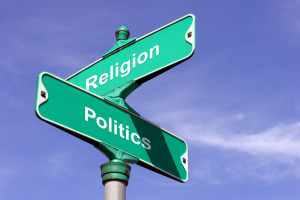Good thinking necessarily requires pulling various strands of thought into something of a poetic amalgamation. Though it is doubtful that my writing could be described as poetic (I’ll leave that to other authors on this blog), I would at least like to take a stab at the amalgamation part. For those new to the two-kingdoms theological grid, the discussion of natural law and the two-kingdoms may seem incongruent. What do these two stands of thought have to do with each other? In this, post I want to lay out how these two ideas explicitly relate to one another.
First we start with the base idea that man operates in two kingdoms, the civil kingdom and the spiritual kingdom. Again, this idea is foreign to many of those on the evangelical right where everything is meant to be Christianized. One-kingdom thinkers often fly the banner of Abraham Kuyper’s famous quote, “There is not a square inch in the whole domain of our human existence over which Christ, who is sovereign over all, does not cry: ‘Mine!’” This statement, is in fact quite accurate but it is not accurate in the way that most one-kingdom thinkers mean it (or the way in which Kuyper likely meant it for that matter). Calvin and the early Reformed orthodoxy would have affirmed that Christ cries out, “Mine,” to all spheres of life but they would have nuanced how Christ’s ownership of life looks different in the various realms (civil and spiritual). For proof of this we need look no further than Calvin himself who wrote in the Institutes of the Christian Religion (III, 19, 15):
Therefore… let us first consider that there is a twofold government in man: one aspect is spiritual, whereby the conscience is instructed in piety and in reverencing God; the second is political, whereby man is educated for the duties of humanity and citizenship that must be maintained among men… The one we may call the spiritual kingdom, the other, the political kingdom. Now these two, as we have divided them, must always be examined separately; and while one is being considered, we must call away and turn aside the mind from thinking about the other. There are in man, so to speak, two worlds, over which different kings and different laws have authority.[1]
Regardless of Calvin’s own practical inconsistencies on the matter, his formulation above sums up the early Reformed orthodox view of how to perceive the world and the church. Were they united in one common cause? No, rather, each had its own purposes, own means and own ends.
Indeed, a distinction that was born of Luther is also helpful in thinking of this two-kingdom framework. Writers in the Reformed tradition (and much more so the Lutheran tradition) have often maintained two distinct aspects of Christ’s kingly office. On the one hand there is the regnum potentiae (rule of power) and on other hand there is the regnum gratiae (rule of grace). Kim Riddlebarger in his article The Triple Cure describes the two ways in which Christ rules with exquisite clarity. By means of introduction he writes of the regnum gratiae, “In the kingdom of grace, Christ is seen to rule the church of which he himself is head. As such, this rule is a spiritual rule, since it is exercised in a spiritual realm. As Berkhof puts it, ‘it is established in the hearts and lives of believers.’” Riddlebarger goes on to explain the regnum potentiae by saying, “The kingdom of power, on the other hand, refers to Christ’s rule or dominion over all of creation. In this case, as creator of all, he is also Lord (Col 1:16-17). He orders the affairs of nations (Is 40:17), and controls the lives and destinies of individuals (Acts 14:15-17, 17:24-27).”
Now, what about this other stand of natural law? How does this relate to the two-kingdoms? As we have seen above, Christ rules the civil realm differently than the spiritual realm. In the civil realm he rules as creator and providential sustainer. In the spiritual realm he rules as redeemer. Because his kingship looks differently in each realm, it necessarily requires a different sort of law to rule over each realm. And here we come to the sharp distinction. Those who are a part of the spiritual realm are ruled by the text of scripture. However, in the civil realm (believer and unbeliever alike), man is ruled by natural law. This law is felt by all men through the presence of conscience and thus it provides a standard uniformity by which all men can make common judgments in order to live in a rightly ordered and just society. That this natural law both exists and has an undeniable seat in the human conscience, one can read from Francis Turretin in his Institutes of Elenctic Theology as he writes that Reformed thinkers:
affirm that there is a natural law, not arising from a voluntary contract of law of society, but from a divine obligation being impressed by God upon the conscience of man in his very creation, on which the difference between right and wrong is founded and which contains the practical principles of immovable truth (such as: ‘God should be worshipped,’ ‘parents should be honored,’ ‘we should live virtuously,’ ‘injure no one,’ ‘do to others what we would wish them to do to us’ and the like). Also that so many remains and evidences of this law are still left in our nature (although it has been in different ways corrupted and obscured by sin) that there is no mortal who cannot feel its force either more or less.[2]
Natural law is neither opaque or obscure. This is not just an affirmation from some old dead theologians but from scripture itself (Romans 2:14-15). Thus, it provides a rather clear standard for the common civil and cultural realm in which all men operate.
These kingdom’s differences are vast. The civil kingdom is meant to reign in external immorality that all men may operate in a land of equity and justice, where property rights are upheld. This spiritual kingdom is meant to transform the hearts of an individual before a holy God. The place of natural law in Calvin’s thinking has often been the subject of great debate. But perhaps these tensions ease when we see the two-kingdoms distinction. On the one hand, natural law is of no use when it comes to gaining God’s favor in the spiritual kingdom. But on the other hand a man can operate quite well in the civil kingdom by obeying its precepts and principles.
These two ideas (natural law and two-kingdoms doctrine) are essential to any well founded social theory. While both kingdom’s are ruled by Christ, it is important to recognize that they are ruled differently. To be sure, proponents of the two-kingdom’s doctrine are not arguing for a secularized state. They recognize God as its sovereign ruler but his rulership looks different here than it does, in say, the church.
It is my hope that this blog has helped tie these two ideas together. In the coming weeks I will move to analyze the practical affects of this doctrine. Below, I have laid out a schedule of how I will approach the practical issues in the coming weeks. The list is in no particular order:
- How two-kingdoms affects the mission of the church.
- How two-kingdoms affects our decision on church security teams.
- Two-kingdoms and the examination of political candidates.
- Two-kingdoms and its trajectory in political theory.
- Two-kingdoms and the libertarian philosophy.
- Two-kingdoms and civil resistance theory.
- Two-kingdoms and Amillenialism.
Many have been waiting for the practical parts of this series. They are nearly here. However, if this is the first article that you have read in this series, I would encourage you to go back and read the other articles. Without the theological foundation, the practical applications will seem short-sighted and ill-contrived. I look forward to continued dialogue on this issue.
Have a great week everyone and happy new year!
[1] Retrieved from Robert Godfrey’s article Kingdom and Kingdoms
[2] Retrieved from David VanDrunen’s book Natural Law and the Two Kingdoms




1 Comment
Leave your reply.